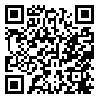دوره 23، شماره 1 - ( 12-1403 )
جلد 23 شماره 1 صفحات 52-43 |
برگشت به فهرست نسخه ها
Download citation:
BibTeX | RIS | EndNote | Medlars | ProCite | Reference Manager | RefWorks
Send citation to:



BibTeX | RIS | EndNote | Medlars | ProCite | Reference Manager | RefWorks
Send citation to:
Homaie Rad E, Shirazikhah M, Shirazikhah A, Sajadi H S. Inequality in Access to Rehabilitation Services for People With Disability Across Iran. Iranian Rehabilitation Journal 2025; 23 (1) :43-52
URL: http://irj.uswr.ac.ir/article-1-2213-fa.html
URL: http://irj.uswr.ac.ir/article-1-2213-fa.html
Inequality in Access to Rehabilitation Services for People With Disability Across Iran. مجله انگلیسی زبان توانبخشی. 1403; 23 (1) :43-52
چکیده: (3236 مشاهده)
Objectives: This study aims to examine the disparities in access to rehabilitation services for people with disability (PWD) in Iran.
Methods: We conducted a secondary analysis of Iran’s access to physical rehabilitation services survey (IAPRSS) in 2019, analyzing data from 2146 PWD nationwide. The selected variables included sex, marital status, literacy, employment status, type of rehabilitation service, deprivation of access to rehabilitation services (DARS) and activity of daily living (ADL). We used the GINI index, Lorenz curve and concentration index (CI) to investigate inequality and analyzed data using STATA SE software, version 13.1.
Results: The GINI index for DARS was 0.423±0.003. The highest GINI index was observed in the transport dimension at 0.551±0.003, while the lowest was associated with affordability at 0.499±0.003. The CI for DARS was -0.062±0.008, indicating that PWD with lower ADL scores had more deprivation in access to rehabilitation services. Considering the wealth index as the ranking variable, the CI for the DARS was -0.100±0.010, showing better access to rehabilitation services for PWD with better socioeconomic status (SES). The CI was higher for orthotics and prosthetics services -0.131±0.027, indicating that the inequity of accessibility was higher for this type of rehabilitation service. Inequity of accessibility was higher among men (-0.117±0.014). Regarding the wealth coefficient, PWD who were rich (coefficient=-2.14, %95 CI, -2.68%, -1.59%), younger (coefficient=-0.08, %95 CI, -0.77 %, -0.32%) and had lower ADL scores (coefficient=-0.55, %95 CI, -0.77%, -0.32%) had lower DARS scores. PWD with high school degree (coefficient=3.54, %95 CI, 0.69%, 6.39%) and those without health insurance coverage (coefficient=3.42, %95 CI, 1.32%, 5.51%) had higher DARS scores.
Discussion: Despite recent efforts to enhance equity in health access, disability continues to present an additional barrier to accessing healthcare in Iran. Targeted policies and interventions that meet the needs for equality of PWD are advisable, including establishing a national registry or database system for PWD, expanding the adequate coverage of PWD and rehabilitation services, enhancing service accessibility and implementing educational initiatives that improve health literacy among PWD.
Methods: We conducted a secondary analysis of Iran’s access to physical rehabilitation services survey (IAPRSS) in 2019, analyzing data from 2146 PWD nationwide. The selected variables included sex, marital status, literacy, employment status, type of rehabilitation service, deprivation of access to rehabilitation services (DARS) and activity of daily living (ADL). We used the GINI index, Lorenz curve and concentration index (CI) to investigate inequality and analyzed data using STATA SE software, version 13.1.
Results: The GINI index for DARS was 0.423±0.003. The highest GINI index was observed in the transport dimension at 0.551±0.003, while the lowest was associated with affordability at 0.499±0.003. The CI for DARS was -0.062±0.008, indicating that PWD with lower ADL scores had more deprivation in access to rehabilitation services. Considering the wealth index as the ranking variable, the CI for the DARS was -0.100±0.010, showing better access to rehabilitation services for PWD with better socioeconomic status (SES). The CI was higher for orthotics and prosthetics services -0.131±0.027, indicating that the inequity of accessibility was higher for this type of rehabilitation service. Inequity of accessibility was higher among men (-0.117±0.014). Regarding the wealth coefficient, PWD who were rich (coefficient=-2.14, %95 CI, -2.68%, -1.59%), younger (coefficient=-0.08, %95 CI, -0.77 %, -0.32%) and had lower ADL scores (coefficient=-0.55, %95 CI, -0.77%, -0.32%) had lower DARS scores. PWD with high school degree (coefficient=3.54, %95 CI, 0.69%, 6.39%) and those without health insurance coverage (coefficient=3.42, %95 CI, 1.32%, 5.51%) had higher DARS scores.
Discussion: Despite recent efforts to enhance equity in health access, disability continues to present an additional barrier to accessing healthcare in Iran. Targeted policies and interventions that meet the needs for equality of PWD are advisable, including establishing a national registry or database system for PWD, expanding the adequate coverage of PWD and rehabilitation services, enhancing service accessibility and implementing educational initiatives that improve health literacy among PWD.
نوع مقاله: پژوهشي |
موضوع مقاله:
مدیریت توانبخشی
دریافت: 1402/12/9 | پذیرش: 1403/6/10 | انتشار: 1403/12/11
دریافت: 1402/12/9 | پذیرش: 1403/6/10 | انتشار: 1403/12/11





